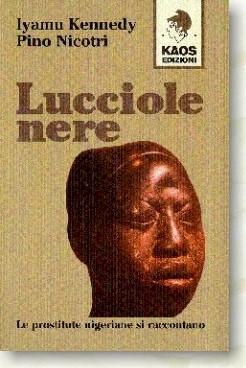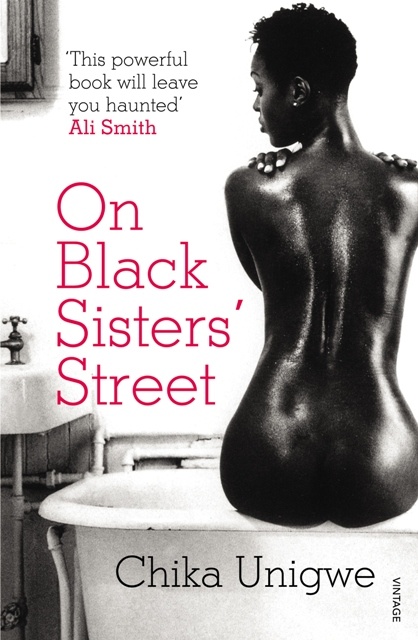 Anti-trafficking campaigners often single out Nigerian women as the worst case of what they call sex trafficking. I first wrote about this years ago and note that, despite critiques and debunkings, the trend holds. In stories about Nigerian migrant women, ‘rituals’ are usually cited that are supposed to have bound them in a specially sinister way to smugglers. It’s straight-up racist colonialism, the inability and unwillingness to conceive of even the most superficial aspects of a non-western culture. Lurid conclusions are jumped to immediately according to which juju ceremonies are not comparable to Roman Catholic ones, for one example – though promises, petitions and talismans are found in both. As though one sort of prayer for help or success were inherently irrational and the other not.
Anti-trafficking campaigners often single out Nigerian women as the worst case of what they call sex trafficking. I first wrote about this years ago and note that, despite critiques and debunkings, the trend holds. In stories about Nigerian migrant women, ‘rituals’ are usually cited that are supposed to have bound them in a specially sinister way to smugglers. It’s straight-up racist colonialism, the inability and unwillingness to conceive of even the most superficial aspects of a non-western culture. Lurid conclusions are jumped to immediately according to which juju ceremonies are not comparable to Roman Catholic ones, for one example – though promises, petitions and talismans are found in both. As though one sort of prayer for help or success were inherently irrational and the other not.
That’s not to say that conditions are not pretty dire for many women and men in western Africa, politically, economically, on the gender front – which means people can be willing to take big risks and assume onerous debts when they travel to work abroad. Early in my studies I learned about how some migrants think about that in Lucciole neri – Le prostitute nigeriane si raccontano (Iyamu Kennedy and Pino Nicotri, editors, 1999), one of my sources of ethnographic research with migrants who sell sex in Europe, for what eventually became Sex at the Margins. These Nigerians were working in Italy. [NB: It’s never clear whether the label Nigerian actually means born in and identified with that country. In the world of migration national identities are shifty.]
 On Black Sisters’ Street, by Chika Unigwe, came out in 2009. I was prompted to read it by This is Africa’s mention of it along with Sex at the Margins. It’s a novel telling the stories of four women’s migrations from Nigeria to Belgium where they work in windows in the red-light district. None of them has had an easy life and none of them sees herself as a victim, despite the presence of a powerful smuggler in Lagos and a controlling madam in Antwerp. They are, the author says, willing to play the trump card that God has wedged in between their legs. Unigwe has said:
On Black Sisters’ Street, by Chika Unigwe, came out in 2009. I was prompted to read it by This is Africa’s mention of it along with Sex at the Margins. It’s a novel telling the stories of four women’s migrations from Nigeria to Belgium where they work in windows in the red-light district. None of them has had an easy life and none of them sees herself as a victim, despite the presence of a powerful smuggler in Lagos and a controlling madam in Antwerp. They are, the author says, willing to play the trump card that God has wedged in between their legs. Unigwe has said:
If your parents can’t help you out and your government has failed you, these pimps and traffickers have at least given you a chance to leave and make a living. He’s your saviour. It takes someone outside the situation to see these pimps and traffickers as the bad guys.
At the end of the book we are told how three of the women fare in the future. After nine years in Antwerp, Efe became a madam herself.
It would take eighteen months to get her first of two girls whom she would indeed buy at an auction presided by a tall, good-looking Nigerian man in sunglasses and a beret. It would be in a house in Brussels, with lots to drink and soft music playing in the background. The women would enter the country with a musical band billed to perform at the Lokerenfeest. The man in the sunglasses was the manager of the band and as usual had, in addition to genuine members of the band, added the names of the women who had paid him to the list he submitted at the embassy in Abuja. The women would be called into the room one at a time for the buyers to see and admire. They would all have numbers, for names were not important. Their names would be chosen by whoever bought them. Names that would be easy for white clients to pronounce… Efe would buy numbers five and seven. Number five because she smiled easily. Number seven because she looked docile and eager to please, the sort of girl who was grateful for little. Like Madam, Efe would have some police officers on her payroll to ensure the security of her girls and of her business. She would do well in the business, buying more girls to add to her fleet. pp 278-9
Yes, this is an auction where employers bid on women who will sell sex, but beware glossing all nuances and calling it slave-trading. The women in question want to migrate and accept they’ll be selling sex and paying off a debt. Which doesn’t mean they know everything that may happen to them and how constrained life will be in another country. The Three-Headed Dog, my own recent novel, is about the same dynamics, with Latin Americans in Spain but also a strong Nigerian character – Promise.
I first published this post only slightly changed on 22 September 2011 and publish it again now as part of a series on sex work in fiction.
–Laura Agustín, the Naked Anthropologist
